
Breaking News
 James O'Keefe: My entire speech at AmericaFest 2025. We're not stopping. Join us to expose..
James O'Keefe: My entire speech at AmericaFest 2025. We're not stopping. Join us to expose..
 U.S. vs. Chinese Military Comparison – Focus on Asia-Taiwan Scenario
U.S. vs. Chinese Military Comparison – Focus on Asia-Taiwan Scenario
 DoJ Sues Four More States for Failing To Produce Voter-roll Data
DoJ Sues Four More States for Failing To Produce Voter-roll Data
 World's Largest Aviation Giant Abandons Google Over Security Concerns
World's Largest Aviation Giant Abandons Google Over Security Concerns
Top Tech News
 Perfect Aircrete, Kitchen Ingredients.
Perfect Aircrete, Kitchen Ingredients.
 Futuristic pixel-raising display lets you feel what's onscreen
Futuristic pixel-raising display lets you feel what's onscreen
 Cutting-Edge Facility Generates Pure Water and Hydrogen Fuel from Seawater for Mere Pennies
Cutting-Edge Facility Generates Pure Water and Hydrogen Fuel from Seawater for Mere Pennies
 This tiny dev board is packed with features for ambitious makers
This tiny dev board is packed with features for ambitious makers
 Scientists Discover Gel to Regrow Tooth Enamel
Scientists Discover Gel to Regrow Tooth Enamel
 Vitamin C and Dandelion Root Killing Cancer Cells -- as Former CDC Director Calls for COVID-19...
Vitamin C and Dandelion Root Killing Cancer Cells -- as Former CDC Director Calls for COVID-19...
 Galactic Brain: US firm plans space-based data centers, power grid to challenge China
Galactic Brain: US firm plans space-based data centers, power grid to challenge China
 A microbial cleanup for glyphosate just earned a patent. Here's why that matters
A microbial cleanup for glyphosate just earned a patent. Here's why that matters
 Japan Breaks Internet Speed Record with 5 Million Times Faster Data Transfer
Japan Breaks Internet Speed Record with 5 Million Times Faster Data Transfer
Transplanted pig heart kept ticking for over two years

This record-breaking outcome leaves scientists hopeful for the potential for xenotransplantation, the transplantation of animal organs or tissues into humans, to address worldwide organ shortages.
A number of animal species have been considered as potential candidates for organ transplantation. Chimpanzees seemed like the obvious option due to the similar size of their organs and good blood type compatibility, but were ruled out as they are an endangered species. Baboons were also considered, but presented their own set of problems, including smaller body size, infrequency of blood type O and long gestation period. This has led to pigs becoming the potential organ donor of choice, as they share multiple complementary proteins with humans and their organs are of a similar size.

 Advanced Propulsion Resources Part 1 of 2
Advanced Propulsion Resources Part 1 of 2

